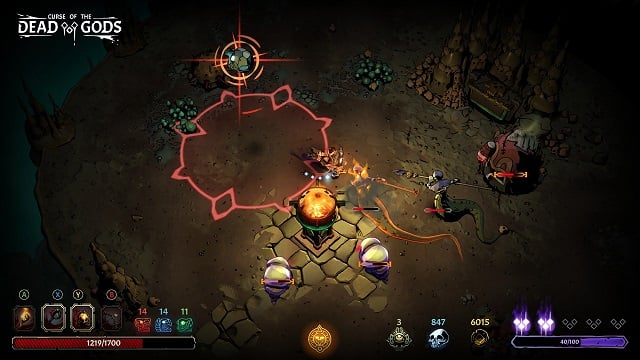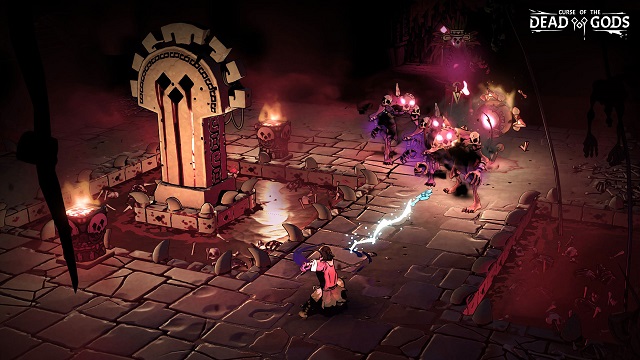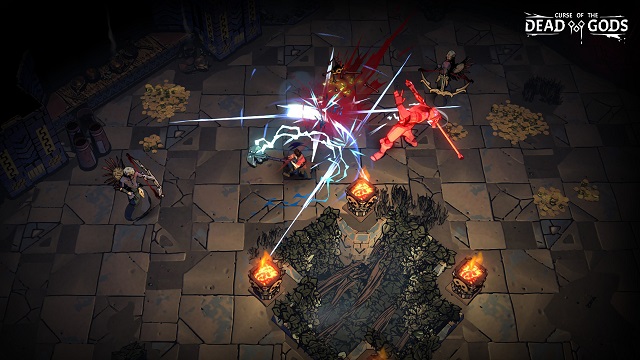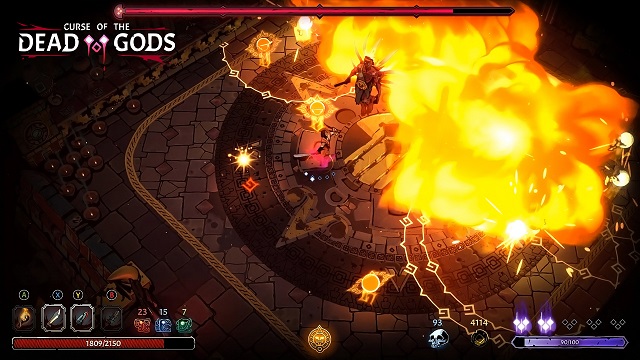It’s pretty easy to look at Curse of the Dead Gods and dismiss it as riding the coattails of Hades. There are definitely a lot of similarities between the two, but Curse of the Dead Gods eschews much of the storytelling elements that make Hades stand out to deliver a more traditional, but never inferior, action roguelike experience.
If you’ve been in search of an action game that will punish you for getting cocky and reward your patience and practice, Curse of the Dead Gods is a temple of doom full of deadly treasures.
I took a look at it last year when it first started kicking around in Early Access, and I enjoyed it for its excellent risk-reward balance, difficulty, and customization. It felt like a good time to check back in and see what the full release looks like.
Curse of the Dead Gods Review: The Temple of Doom
Curse of the Dead Gods casts you in the shoes of a daring explorer who seemingly gets locked in an ancient, ever-shifting temple. On top of that, you’ve been inflicted with a horrible curse that builds as you progress further and further through it.
What that means is you’ll move through a series of procedurally generated rooms, battling enemies and collecting powerups as you go, before eventually coming across a boss (or, in longer runs, multiple bosses) in the hopes that you’ve become strong enough to take them on.
Otherwise, you’ll be zipped back to the beginning to take on another run.
This probably sounds familiar, because, well, it is. Curse of the Dead Gods doesn’t break a ton of new ground in the genre. However, it does everything in the roguelike realm very well, and it does have a few clever ways to get its hooks in you. Let’s start with the familiar stuff that it does well.

Combat feels silky, and it’s difficult without being unfair. You battle a lot of foes at once, and learning to prioritize the most dangerous ones is one key to success. Dodging and heavy attacks take stamina, which refills after a short time of not taking any actions, so learning how to pace yourself, strike, and get to safety is another key. You can also parry, leaving your foes vulnerable and instantly refilling a bit of stamina.
On top of all that, there are a variety of primary, secondary, and heavy weapons to find, all with procedurally generated abilities and status effects, so using them wisely is the third and final key.
It is a lot to keep track of, but it never feels completely overwhelming. The difficulty curve of Curse of the Dead Gods is a lot less punishing than many roguelikes, and you’ll be dodging and parrying like a pro before you know it.
As you move through your early runs, you’ll only have a handful of rooms to get through before you take on a boss. It isn’t to say these early runs are easy, but you won’t suffer too much attrition before reaching the end. And, even if you do, Curse of the Dead Gods plays fast and loose in handing out its persistent resources, which you can use to buy permanent upgrades to take on later runs.

That’s when some of the wrinkles in Curse of the Dead Gods shine through.
Those titular curses are a big part of things. As you pass through doors or battle certain enemies, your Corruption meter builds. When it hits critical mass, you’ll be inflicted with a game-altering curse. Some of these are generally harmless, and some can even be beneficial to certain playstyles.
As runs get longer and enemies get tougher, however, these curses can build up on one another, leading to unintended combinations that can be impossible to overcome. If you hit your fifth curse on a single run, it’s practically a death sentence, though defeating a boss does let you knock a curse off.
Curses make the game even more fascinating because some of the best room rewards can only be obtained by taking a heavy hit to your Corruption meter. Is it worth it to add another random negative effect for an extremely powerful weapon or perk? It might be!
Light and dark play a big role in Curse of the Dead Gods, too. You can swap to your torch and use it to light braziers in the environment, or even set flammable parts of the environment afire, watching it spread to, perhaps, cause an explosion. Light helps you see enemies from further away, of course, but it can also cause you to take or deal more damage in darkness.
The risk-reward element is alive and well in Curse of the Dead Gods and, because it’s an action game, you never feel completely hopeless.
Deckbuilder roguelikes often have that “critical mass” moment where you realize you won’t be able to successfully complete a run, even if you haven’t hit the roadblock yet. Curse of the Dead Gods’ combat still puts enough control in your hands that you feel like making it through one more room could give you the edge you need.
Curse of the Dead Gods—The Bottom Line

Pros
- Combat is difficult without being unfair and extremely rewarding when you get it right
- Corruption and darkness add nice layers of risk-reward to runs
- Interesting art style and slick animations
Cons
- Becomes repetitive quicker than many other roguelikes
- Could use a bit more of a story and narrative
Where Curse of the Dead Gods falls short is in its replayability. Roguelikes are already somewhat repetitive by design, but without a strong story hook or a huge amount of variety, it can be tough to dive back in for another run.
After putting in about 20 hours for this review, I’m not sure Curse of the Dead Gods is the “long haul” type of roguelike. Hades, Binding of Isaac, Slay the Spire, Monster Train — each keeps revealing more the more hours you sink in. But all in all, that’s a small gripe for an otherwise fantastic game.
If you just want an old-school roguelike to test your mettle, you can’t go wrong with Curse of the Dead Gods. It’s the right mix of challenge and experimentation, providing dozens of hours of playtime before it starts to wear. After that, you may even find self-imposed challenges and the chase of perfection enough to keep you delving back in for another run.
[Note: Focus Home Interactive provided the copy of Curse of the Dead Gods used for this review.]







Published: Mar 2, 2021 04:19 pm